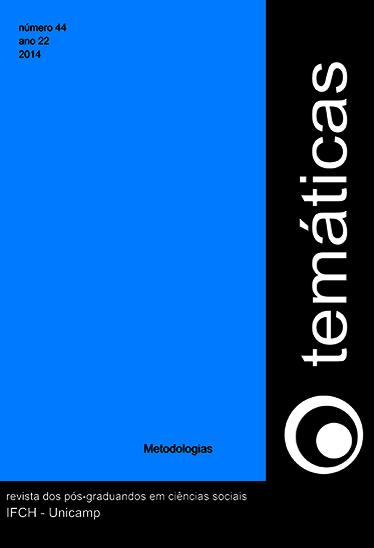Abstract
The voices that question the positivism and the inability of its theoretical-analytical instruments to conceptualize the dynamism of the contemporary world come from different places with different agendas. An ethical commitment, which recognizes the ideological and subjective character of the scientific company and believes in negotiating the limits of participation in interaction and a political agenda, responsible for the effects of research, committed to change and the denormatization of society are among these voices of change and among the perspectives discussed in the text. Advocating a hybrid, undisciplinary methodology that respects sensations and feelings as legitimate producers of knowledge and that bets on desire and eroticism as a source of inspiration, the need to unlearn rusty paradigms is discussed so that social theorizations are not anachronistic at the time. The recognition of the researcher's subjectivity, body and desires as inflections of knowledge production will be defended. As well as the production and support of the distinction between subject and object in the scientific narrative, the level of involvement of the researcher with studied practices and the effects of their presence in the field are on the agenda. Some postmodern challenges to ethnography will be discussed on the basis of examples extracted from sexual netnography.
References
ALTORK, W. Walking the fire line: the erotic dimension of the fieldwork experience. In: KULLICK, D. & WILSON, M. (Ed.) Taboo: sex, identity and erotic subjectivity in anthropological fieldwork. New York: Routledge, 1996 [1995] p.107-139.
ALVES-MAZZOTTI, Al. J.e GEWANDSZNAJDER, F. O método nas ciências naturais e sociais: pesquisa quantitativa e qualitativa. 2ª. Ed. São Paulo: Editora Pioneira, 1998.
AUSTIN, J. L. Quando dizer é fazer. Palavras e ação. Conferência 2. Trad. Danilo Marcondes. Porto alegre: Artes Médicas 1990 [1962].
BOLTON, R. Tricks, friends and lovers: erotic encounters in the field In: KULLICK, D. & WILSON, M. (Ed.) Taboo: sex, identity and erotic subjectivity in anthropological fieldwork. New York: Routledge, 1996 [1995] p. 140-167.
BROCKMEIER, J. & OLSON, D. R. The literacy episteme: from Innis to Derrida. In: OLSON, D. R. & TORRANCE, N. The Cambridge Handbook of Literacy. Cambridge: Cambridge University Press, 2009.
BUTLER, J. Undoinggender. New York: Routledge, 2004 [1991].
BUTLER, J. Bodies That Matter : on the discursive limits of “sex”. New York: Routledge, 1993.
DEBORD, G. LaSociétéduSpectacle. Paris: Buchet/Chastel, 1967.
DESCARTES, R. Meditações sobre filosofia primeira; Trad. Fausto Castilho; Ed. da Unicamp; Campinas, 2004 [1641].
FABRÍCIO, B. F. Linguística Aplicada como espaço de “desaprendizagem”: redescrições em curso. In: MOITA LOPES, L.P. (Org.). Por uma Linguística Aplicada (In)disciplinar. São Paulo: Parábola Editorial, 2006.
FRAGOSO, S. RECUERO, R. AMARAL, A. Métodos de Pesquisa para Internet. Porto Alegre: Sulina, 2010.
FRIDMAN, M. Vertigens pós-modernas: configurações institucionais contemporâneas. Rio de Janeiro: Relume Dumará, 2000.
KENDALL, L. How does issues of gender and sexuality influence the structures and processes of qualitative internet research? In: MARKHAM A. & BAYM, N (Ed.). Internet inquiry: conversations about method. Los Angeles, Sage Publications, Inc, 2009.
MOITA LOPES, L. P. Uma Linguística Aplicada mestiça e ideológica: interrogando o campo como lingüista aplicado In: MOITA LOPES, L.P. (Org.). Por uma Linguística Aplicada (In)disciplinar. São Paulo: Parábola Editorial, 2006.
MORENO, E. Rape in the field: reflections from a survivor. In: KULLICK, D. & WILSON, M. (Ed.) Taboo: sex, identity and erotic subjectivity in anthropological fieldwork. New York: Routledge, 1996 [1995] p. 219-250.
MORSE, Janice. “Emerging from the Data”: the cognitive process of analysis in qualitative inquiry. In MORSE, J. (Ed.) Critical Issues in Qualitative Research Methods. London: Sage. 1994.
NUNAN, David. Research Methods in Language Learning. Cambridge University Press, 18a. Ed., 2008 [1992].
PENNYCOOK, A. Uma Linguística aplicada transgressiva. In: MOITA LOPES, L. P. (Org.) Por uma Linguística Aplicada (In)disciplinar. São Paulo: Parábola Editorial, 2006.
PERLONGHER, N. O negócio do michê. São Paulo. 2ª Edição. Ed. Fundação Perseu Abramo, 2008.
SIBILIA, P. El artista como espetáculo: autenticidad y performance em la sociedad mediática. Revista Dixit 7/2013.
SOUZA, P. Confidênciasda carne. Ed. Unicamp, Campinas, 1994.
SCHWANDT, T. A. Três Posturas Epistemológicas para a investigação qualitativa-Interpretivismo, hermenêutica e construcionismo social. In N. K. DENZIN & Y. S. LINCOLN (Eds.), O planejamento da pesquisa qualitativa: teorias e abordagens. 2ª. Ed. Porto Alegre: Artmed, 2007.
SONTAG, S. Contra a Interpretação. Porto Alegre: L&PM, 1987.
SUNDÉN, J. Response to Lori Kendall. In: MARKHAM A. & BAYM, N (Ed.) Internet inquiry: conversations about method. Los Angeles, Sage Publications, Inc, 2009.
WENGER, E. Community of practice: learning, meaning and identity. Cambridge: Cambridge University Press, 1998.
WORTHAM, S. Narratives in action. A strategy for research and analysis. Nova York: Teacher’s College Press, 2001.
ZAGO, L. & SANTOS L. Corpo, gênero e sexualidades gays na corda bamba ético-metodológica: um percurso possível de pesquisa na internet. in: Cronos: Natal, v. 12, n. 2, p. 39-56, jul./dez. 2013.

This work is licensed under a Creative Commons Attribution-NonCommercial-ShareAlike 4.0 International License.
Copyright (c) 2014 Gleiton Matheus Bonfante

